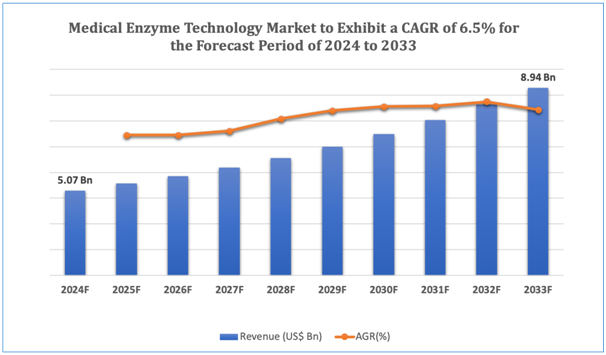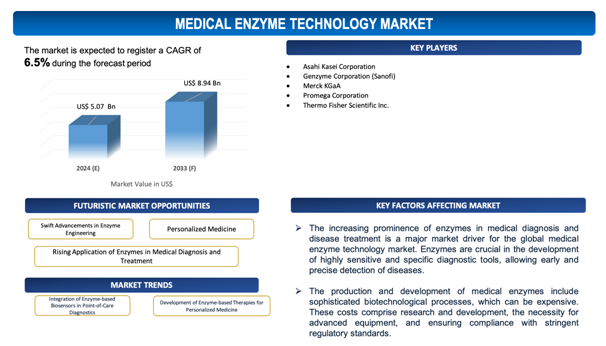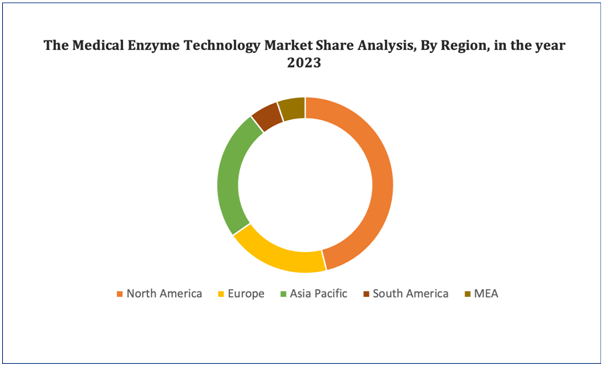Medical Enzyme Technology Market Overview
The global medical enzyme technology market is estimated to be worth over USD 8.94Bn in 2033 and is expected to grow at CAGR of6.5 % during the forecast period (2024-2033).
Medical enzyme technology is revolutionizing the healthcare industry by harnessing the catalytic properties of enzymes to diagnose, treat, and prevent various diseases. Enzymes, which are naturally occurring proteins that accelerate biochemical reactions, are now being engineered and utilized in innovative ways to improve medical outcomes. In diagnostics, enzymes hold a critical role in biosensors and assays that identify diseases with high specificity and sensitivity. For example, glucose oxidase is widely used in blood glucose meters for diabetes management, providing rapid and accurate results that are essential for effective patient care.
In therapeutics, enzyme replacement therapies (ERT) have transformed the treatment of rare genetic disorders, such as lysosomal storage diseases. These therapies includes the administration of recombinant enzymes to replace deficient or malfunctioning enzymes in patients, notablyenhancing their quality of life and prognosis. In addition, enzymes are used in drug development and targeted drug delivery systems. Enzyme prodrug therapies, where inactive drugs are activated by specific enzymes at the target site, reduce side effects and improve therapeutic efficacy.
Moreover, medical enzyme technology is driving advancements in personalized medicine. Enzymes can be personalized to individual patient needs, allowing for customized treatments that are more effective and have fewer adverse effects. The use of enzymes in tissue engineering and regenerative medicine is another noteworthy application. Enzymes support the growth and repair of tissues, providing new solutions for injuries and degenerative diseases.
The biotechnology industry is also benefiting from medical enzyme technology through the development of biocatalysts for the production of pharmaceuticals. These biocatalysts improve the efficiency and sustainability of manufacturing processes, resulting in more cost-effective and eco-friendly production methods.
In summary, medical enzyme technology is transforming healthcare by allowingaccurate diagnostics, efficient treatments, and advanced therapeutic approaches. Its applications scale from personalized medicine to regenerative therapies, substantiallyimproving the capability to diagnose, treat, and manage different health conditions, thereby redefining the outlook of modern medicine.
Figure 1. Medical Enzyme Technology : Market Size

Get more details on this report - Request Free Sample
Key Market Insights
The global medical enzyme technology market is witnessing robust growth, led by developments in biotechnology and a growing demand for precise diagnostics and innovative therapies. Latest market insights reveal a majorsurge in the adoption of enzyme-based diagnostic tools, particularly in point-of-care testing and biosensors. Enzymes such as glucose oxidase and lactate dehydrogenase are crucial in developing rapid, sensitive diagnostic assays, enhancing disease detection and management.
A significant development in the market is the expansion of enzyme replacement therapies (ERT) for rare genetic disorders. The success of ERT in treating lysosomal storage diseases has led the way for new enzyme-based treatments, enhancing patient outcomes and quality of life. In addition, the usage of enzymes in drug development is propelling, with enzyme prodrug therapies gaining momentum for their ability to target specific disease sites, minimizing side effects and improving therapeutic efficiency.
Novel technologies are also revolutionizing the market outlook. Advances in recombinant DNA technology and protein engineering have allowed the production of highly specific and efficient enzymes. These advancements are being applied in personalized medicine, where enzymes are customized to individual patient profiles for more effective treatments. Alongside, the incorporation of enzymes in tissue engineering and regenerative medicine is emerging as a promising area, offering novel solutions for tissue repair and regeneration.
Sustainability is another prominent trend, with the development of biocatalysts for pharmaceutical manufacturing. These enzyme-based catalysts enhance the efficiency and environmental footprint of drug production processes.
Thus, the global medical enzyme technology market is marked by swift technological advancements and expanding applications in diagnostics, therapeutics, and biomanufacturing. The emphasis on precision medicine, advanced therapies, and sustainable production methods is fuelling market growth and redefining the future of healthcare.
Market Dynamics
Market Drivers
Rising Applicationof Enzymes in Medical Diagnosis and Treatment
The increasingprominence of enzymes in medical diagnosis and disease treatment is a major market driver for the global medical enzyme technology market. Enzymes are crucial in the development of highly sensitive and specific diagnostic tools, allowing early and precise detection of diseases. This is especially evident in point-of-care testing, where enzyme-based biosensors and assays offerswift results, essential for timely medical interventions. For example, glucose oxidase in blood glucose meters enables for immediate diabetes management, while other enzyme assays are essential in identifyinginfectious diseases, cardiovascular diseases, and cancer biomarkers. This improves patient outcomes by promoting early diagnosis and effective disease management.
In disease treatment, enzymes are transforming therapeutic approaches. Enzyme replacement therapies (ERT) have revolutionized the treatment of rare genetic disorders, such as lysosomal storage diseases, by supplementing deficient enzymes, thus enhancing patient health and quality of life. Alongside, enzyme prodrug therapies, where inactive drugs are activated by specific enzymes at the disease site, provide targeted treatment options with minimized side effects, accelerating the safety and efficacy of drug therapies.
The developments in recombinant DNA technology and protein engineering have enabled the production of highly specific, efficient, and stable enzymes customized to individual patient needs, leading the way for personalized medicine. Enzyme-based treatments can be personalized, leading to more effective and individualized therapeutic regimens. Furthermore, the integration of enzymes in novel drug delivery systems and regenerative medicine is opening new avenues for innovation in the healthcare industry.
In summary, the crucial role of enzymes in enhancing diagnostic accuracy and developing effective treatments is a significant market driver. This growing importance highlights the potential of medical enzyme technology to revolutionize healthcare, accelerating market expansion and innovation.
Market Restraints
With regard to numerous advantages of medical enzyme technology, the market faces several challenges due to the unique characteristics and requirements associated with these potent pharmaceutical products. Some of the key market challenges include:
- High Production and Development Costs: The production and development of medical enzymes include sophisticated biotechnological processes, which can be expensive. These costs comprise research and development, the necessity for advanced equipment, and ensuring compliance with stringent regulatory standards. Such increased expenses can be aimpediment for smaller companies and start-ups, deterring market entry and expansion. In addition, the cost of recombinant enzyme production and purification can be significant, affecting the overall affordability and accessibility of enzyme-based diagnostics and therapies.
- Regulatory and Quality Control Challenges: The medical enzyme technology market is subject to stringent regulatory requirements to ensure the efficacy, safety, and quality of enzyme-based products. Navigating these complex regulatory frameworks can be time-consuming and resource-intensive, especially as standards vary across various regions. Maintaining consistent quality control during large-scale production is also challenging, as enzymes can be sensitive to changes in manufacturing conditions. These regulatory and quality control hurdles can delay product approvals and market entry, potentially diminishing the commercialization and widespread adoption of new enzyme-based technologies.

Get more details on this report - Request Free Sample
Market Opportunity
Swift Advancements in Enzyme Engineering
Rapid advancements in enzyme engineering stands as a major market opportunity for the global medical enzyme technology market. Enzyme engineering, especially through methods such as directed evolution and rational design, enables the precise modification of enzymes to improve their specificity, stability, and catalytic efficiency. These developmentsallow the creation of tailored enzymes that can be optimized for specific medical applications, such as diagnostics, therapeutics, and drug delivery systems. By enhancing enzyme performance, engineered enzymes can offer more accurate diagnostic tests, leading to earlier and more reliable disease detection. This is particularly crucial for conditions where timely intervention is crucial, such as cancer and infectious diseases.
In therapeutics, enzyme engineering promotes the development of novel treatments with enhanced efficacy and minimized side effects. Tailored enzymes can be composed to target specific disease pathways or cellular environments, making them ideal for use in enzyme replacement therapies, prodrug activation, and targeted drug delivery. These engineered enzymes can also be adapted to function under challenging physiological conditions, improving their therapeutic potential and expanding their application range.
Moreover, developments in enzyme engineering support the shift towards personalized medicine. By creating enzymes tailored to individual patient profiles, treatments can be more precisely streamlined with patient needs, enhancing outcomes and reducing adverse reactions. This personalized approach is becoming increasingly significant in modern healthcare, where precision and customization are key.
Therefore, the swift progress in enzyme engineering is fuelling innovation in the medical enzyme technology market, offering new opportunities for enhanced diagnostics, more effective treatments, and personalized healthcare solutions. This technological progress positions the market for continued growth and transformative impacts on the healthcare industry.
Bottom of Form
Market Trends
- Integration of Enzyme-based Biosensors in Point-of-Care Diagnostics: There is a soaring trend towards the integration of enzyme-based biosensors in point-of-care (POC) diagnostic devices. These biosensors, which leverage the catalytic properties of enzymes for the swift and accurate detection of biomarkers, are transforming diagnostics by allowing immediate testing and results in non-laboratory settings. This trend is especially evident in the management of chronic diseases such as diabetes, where glucose oxidase biosensors in blood glucose meters allow for continuous monitoring. The demand for easy-to-use, portable, and reliable POC diagnostic tools is boosting innovation and adoption of enzyme-based biosensors across various medical fields.
- Development of Enzyme-based Therapies for Personalized Medicine: Another major trend is the development of enzyme-based therapies customized to individual patient profiles, advancing the field of personalized medicine. By engineering enzymes to match specific genetic or metabolic profiles, treatments can be customized to enhance efficacy and minimize side effects. This approach is being utilized in areas such as cancer treatment, where enzyme prodrug therapies activate drugs at the tumour site, and in enzyme replacement therapies for rare genetic disorders. The capability to design personalized enzyme therapies that address unique patient needs is gaining momentum, promising more targeted and effective medical treatments.
Medical Enzyme Technology Market: Key Segments
By Enzyme Type
- Digestive Enzymes
- Thrombolytic Enzymes
- Hydrolases
- Others
By Application
- Disease Treatment
- Diagnostic Tools
- Biomedical Research
- Others
By Key Geographical Regions
- North America
- Europe
- Asia-Pacific
- Middle East and Africa
- South America
Figure 4. Medical Enzyme Technology Market: Distribution by Region

Get more details on this report - Request Free Sample
Medical Enzyme Technology Market: Regional Analysis
North America will contribute lucratively towards the global market value over the forthcoming years. The regional market rise is subject to surge in chronic disease occurrence resulting in massive demand for enzyme replacement treatments. In addition to this, soar in funding of research activities pertaining to use of enzymes in healthcare sector is estimated toencourage growth of medical enzyme technology in North America. Furthermore, strong presence of leading players in countries such as the U.S. is anticipated to scale up expansion of medical enzyme technology industry overthe coming years.
Leading Medical Enzyme Technology Developers
Industry Trends and Global Forecasts, 2023-2035 report features an extensive study of the current market landscape, market size and future opportunities associated with the Medical Enzyme Technology market, during the given forecast period. Further, the market report highlights the efforts of several stakeholders engaged in this rapidly emerging segment of the biopharmaceutical industry. Key takeaways of the Medical Enzyme Technology market are briefly discussed below.
The report includes the list of players operating in the global Medical Enzyme Technology market. Some of the key players include:
- Asahi Kasei Corporation
- Genzyme Corporation (Sanofi)
- Merck KGaA
- Promega Corporation
- Thermo Fisher Scientific Inc.
Medical Enzyme Technology Market: Key Developments
- In April 2024, Prozomix, a UK-based biotech company focused on novel biocatalyst discovery and manufacturing, and Ginkgo Bioworks which is building the leading platform for cell programming and biosecurity, announced a new partnership. Together, Ginkgo and Prozomix aim to build out the production of next generation enzyme plates for active pharmaceutical ingredient (API) manufacturing. This collaboration aims to leverage Ginkgo's Enzyme Services and industry-leading AI/ML models along with Prozomix's existing enzyme libraries and deep experience manufacturing enzyme plates.
Scope of the Report
The market report presents an in-depth analysis of the various firms / organizations that are engaged in this market, across different segments, as defined in the below table:
|
|
Key Report Attributes |
Details |
||
|
|
Base Year |
2023 |
||
|
|
Forecast Period |
2024-2033 |
||
|
|
CAGR (2024-2033) |
6.5% |
||
|
|
Enzyme Type |
|
||
|
|
Application |
|
||
|
|
Key Geographical Regions |
|
||
|
Key Companies Profiled |
|
|
||
